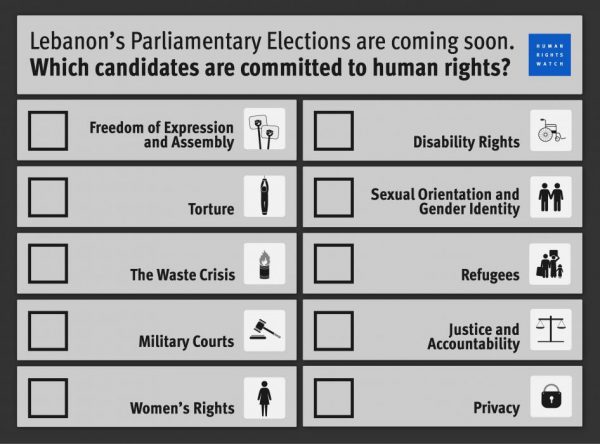
Beirut – Candidates for Lebanon’s May 6, 2018 parliamentary elections should commit to reforms to strengthen human rights protections, Human Rights Watch said today. Human Rights Watch is sending letters to major Lebanese political parties and parliamentary candidates urging them to commit to human rights reforms in ten areas.
The areas Human Rights Watch identifies are: freedom of expression and assembly, torture, the waste crisis, military court trials of civilians, women’s rights, disability rights, sexual orientation and gender identity, refugee rights, justice and accountability, and privacy. Human Rights Watch will issue a statement prior to the elections detailing the commitments candidates and parties have made to strengthen human rights protections.
“Lebanese voters deserve a substantive debate during the campaign about issues that affect them, particularly with respect to human rights,” said Lama Fakih, deputy Middle East director at Human Rights Watch. “Now is the time to publicly commit to reforms that will strengthen Lebanon’s human rights record.”
In particular, candidates should commit to passing laws that will remove civilians from military court jurisdiction, establish a national waste management framework, create an optional civil personal status codeincluding civil marriage, set the minimum marriage age at 18, allow Lebanese women to pass nationality to their children, extend labor protections to migrant domestic workers, reform the kafala sponsorship system, ensure children with disabilities can get a quality education, regulate surveillance, and set up an independent national commission to advance justice and accountability for people forcibly disappeared during the civil war.
Candidates should pledge to repeal laws that criminalize defamation, criticism of public officials and symbols, and consensual adult sexual relations. And they should publicly support the establishment of a National Human Rights Institute and support temporary legal status for Syrian refugees until it is safe for them to return home.
Lebanon’s last parliamentary elections took place in June 2009. After three extensions of their term, members of parliament have more than doubled the time they were elected to serve, dashing the hopes of citizens who had been waiting to elect their representatives since 2013. Because Lebanon’s voting age is 21, some people close to 30 have never had a chance to elect their parliamentary representatives.
“Parliament plays a crucial role in advancing human rights in Lebanon,” Fakih said. “Voters at the ballot box should have a clear idea of which candidates have committed to important reforms.”
HRW

Leave a Reply
You must be logged in to post a comment.